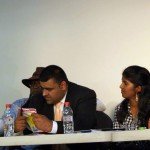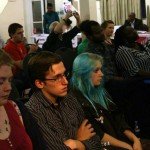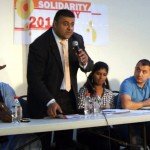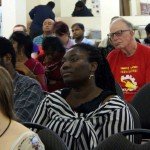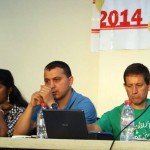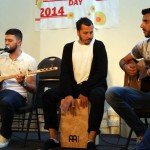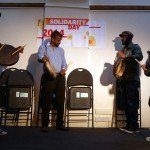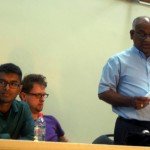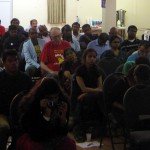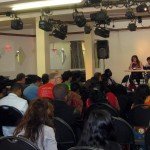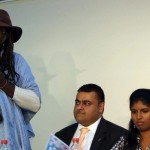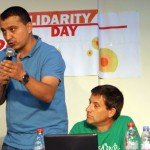‘Solidarity is not just for one day, solidarity’s forever.’
This year’s Solidarity Day was something very special. Co-hosted by Tamil Solidarity campaign and the Day-Mer Turkish and Kurdish community organisation, it brought together activists from communities and rights campaigns and trade union representatives. And the day packed with discussion and debate, music, performance and video, was supplied with a wide range of delicious Tamil food: murukku, kasa, kesari, fish cutlets, idiyappam and sambol, with rice and curries served at the end.
Just walking into the Day-Mer community centre in Tottenham was enough to create a huge impression. Day-Mer has spent a lot of time and work building up an important resource for the Turkish and Kurdish community. And the place was buzzing: young Tamils putting up the banners, posters and displays, setting up the registration table, information and book stalls; while community centre helpers set up the lights and sound system – testing one, two, three (or should that be: bir, iki, üҫ!). Pictures painted in the bunkers during the genocide were on show, provided by the British Tamils Forum.
The Solidarity Day began with a discussion in Tamil on the issue of a common candidate in the future presidential elections in Sri Lanka. Bharathi was on hand to provide translation for English speakers. It was an important debate, introduced by Charles, Fauzer Mahroof and Balan, with Tamil Solidarity represented by Senan, our international coordinator. This is a hot issue among all those standing in opposition to the rule of Mahinda Rajapaksa, and is set to continue.
The second session, chaired by Sarah Sachs-Eldridge, Tamil Solidarity chairperson, saw a line-up of speakers which included Selvi from Day-Mer, Senthil from the BTF, James Ivens (Youth Fight for Jobs), Becci Heagney (Rape is No Joke), Fatheek Asareeri (Stop Bodu Bala Sena), and Keerthikan Thennavan, joint national secretary of Tamil Solidarity. Members of Tamil Solidarity Belgium were unable to attend because of the high cost of getting a visa into the UK. It is the same old story: if you’ve got money you can move freely; if you haven’t, the borders are closed, and freedom restricted. It was a great shame they could not join us on this important occasion, though they sent a very good message of support.
James outlined the exploitation faced by young people in Britain: in low-paid, zero-hour contract work. He explained the importance of getting involved in the workers’ movement.
Becci brought out some shocking statistics to illustrate the extent to which discrimination against women is still a huge issue in society. Women who have been raped are often blamed – for the clothes they wear or how they behave – rather than being supported and the crime investigated. The link with the increase in sexual violence against women in Sri Lanka, and its use as a weapon of war in other conflicts, was made.
Fatheek detailed the rise of Bodu Bala Sena in Sri Lanka, which is led by Buddhist Sinhala nationalist monks, and is leading attacks against Tamil Speaking Muslims. It is backed behind the scenes by the Rajapaksa regime, and is clearly being used to sow division and distrust – if Sinhalese people can be diverted to blame the Muslims for the problems in society, it will be harder to unite a movement of workers and the poor against the regime. This issue was also a feature of last year’s Solidarity Day, and once again we renewed our support for the work of the Stop Bodu Bala Sena campaign.
Selvi explained how the work of Day-Mer has developed over the years. Keerthikan spoke about the campaigns being run by Tamil Solidarity, and Senthil on the work of the BTF. Keerthikan also replied to the questions from the floor and summed up the discussion.
Following those two sessions, a screen was erected to show the harrowing film by Salma, depicting the life of a young Tamil Speaking Muslim woman. It is a very moving piece and deserves to be seen by many more people.
Marvin Hay then took the mic to compere a dizzying array of musicians and performers. Rani Moorthy’s extract from her one-woman play, Kool, was a serious delight. With a biting wit she satirised the portrayal of war in the media, and shone a light on the complexities of identity and nationality, capturing the struggles that Tamils in Sri Lanka and elsewhere face.
Parai Voice of Freedom drummed up a storm, beating back centuries of caste discrimination. Rapper, MC Starboy, strode across stage – a Tamil with attitude. And Day-Mer members played and sang upbeat songs on the saz (a Turkish stringed instrument), guitar and percussion box. It was entertaining and uplifting, raising our spirits and raising the roof!
Another quick change and the stage was once more a platform for the speakers in the final Solidarity rally, chaired by Tamil Solidarity trade union organiser, Isai Priya. Unfortunately, four of the original line-up were not able to attend, due to other important engagements. Nick Crook, from the international department of Britain’s largest public sector trade union, Unison, sent a message of support looking forward to continuing our work together. As did Chris Baugh, assistant general secretary of the civil service union, PCS, and Paul Kershaw, of the Unite union, both long-time supporters of the campaign.
Although John McDonnell, Labour MP, could not make it to the rally, he wrote: ‘I am firmly with you in spirit. Solidarity Day is a great initiative… We will not stand by and allow discrimination against Tamils go unchallenged… Let us work in unity to further the cause of the Tamil People. Solidarity.’
Nonetheless, the line-up was impressive. April Ashley, a member of Unison’s national executive and its Black Members’ group, described how her union branch protested to the Home Office last year over the attendance of David Cameron and William Hague at the Commonwealth heads of government meeting last November.
George Atwall, a regional organiser of the Bakers Food and Allied Workers Union, explained how low-paid workers at Hovis took strike action against plans to downgrade them to zero-hours contracts. A determined two-week long strike, in the face of extreme harassment by the management, ended in a total victory for the workers. The Bakers’ union is on a membership drive in other low-paid workplaces, such as fast-food outlets – where many young Tamils work.
Martin Powell Davies, on the national executive of the National Union of Teachers, has spoken at numerous Tamil events, including the Parliament Square protests back in 2009, Mullivaikal 2012, and at many of our meetings. He linked the campaign to defend education from cut-backs to life in Britain for young Tamils, and to the need to build unity between teachers, parents and students.
Glenroy Watson, chair of the Finsbury Park branch of the Rail Maritime and Transport union, drew on a wealth of experience working on the underground. He called on people not only to join a trade union, but to get active in the union to ensure that it fully represents its members.
Oktay Sahbaz explained how Day-Mer began as a help-and-advice centre to workers from their community coming to Britain. As they became more established, they built links to the wider community and to the trade union movement. Now, they are fully involved in the day-to-day struggles of people living in Britain, such as campaigns to defend jobs and services. It is an approach which has much in common with that of Tamil Solidarity, and we are happy to count Day-Mer among our natural allies in the struggle for the right of self-determination for the Tamil-speaking people.
Hannah Sell, deputy general secretary of the Socialist Party, detailed her party’s long association with the struggle for Tamil rights. It was the predecessor of the Socialist Party which organised a mass demonstration in London in 1983 at the time of the Black July massacres. And, while the mainstream media ignored the huge protests in 2009 – and the mass slaughter – its weekly newspaper, The Socialist, exposed the truth. It has consistently supported the Tamil right of self-determination, and the struggle of all workers and oppressed in Sri Lanka.
The final speaker was Tamil Solidarity joint national secretary, Manny Thain, who drew the strands of the discussion together. Far too much work has been done since the last Solidarity Day to mention, but the key was to continue to link up all the struggles of different peoples facing oppression. And to strengthen the links with the trade unions and other workers. ‘Solidarity is not just for one day,’ Manny said: ‘Solidarity’s forever. And we need to continue to work together, learning from each other, united in the fight for the Tamils’ right to self-determination, and for the rights of workers and all oppressed people, in Sri Lanka, Turkey, and all around the world.’
The event was made successful by all the hard work put in, especially by the young Tamil Solidarity members. They took on many responsibilities, including caring for the children, which allowed their parents to participate fully in the events.
It was a truly inspirational day. We must now take this momentum forward and continuing to build our movement. Support us and join us!
Please make a donation to our financial appeal: to help us organise more events like this, and to further develop this dynamic campaign.

